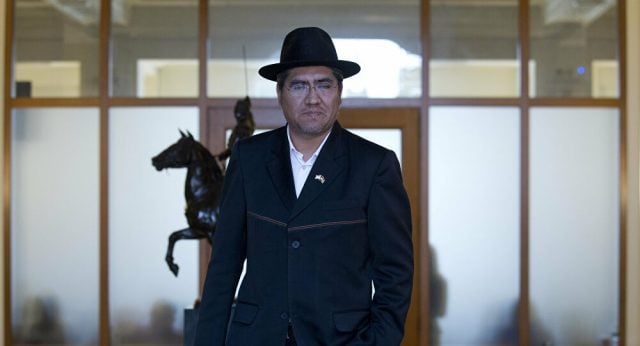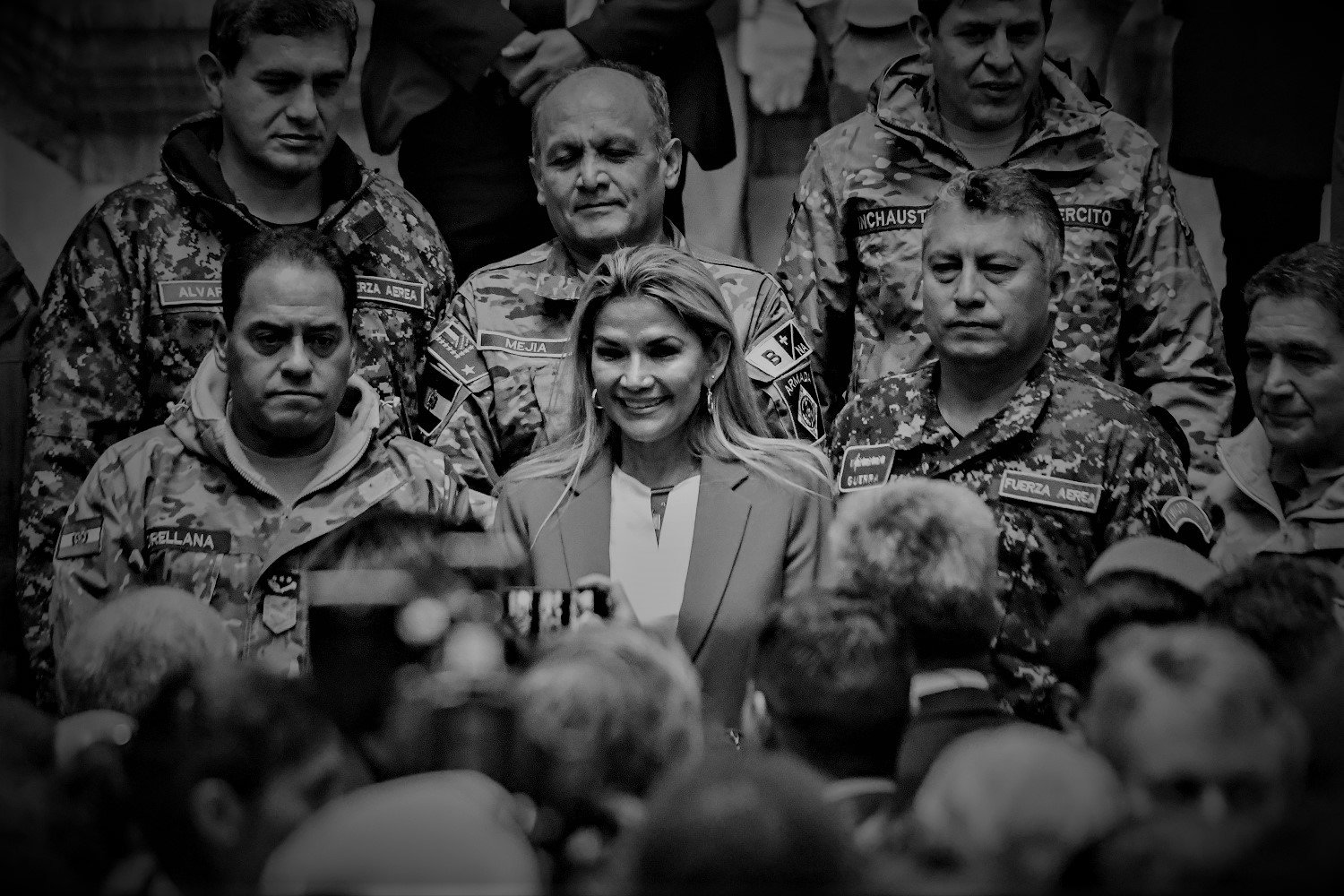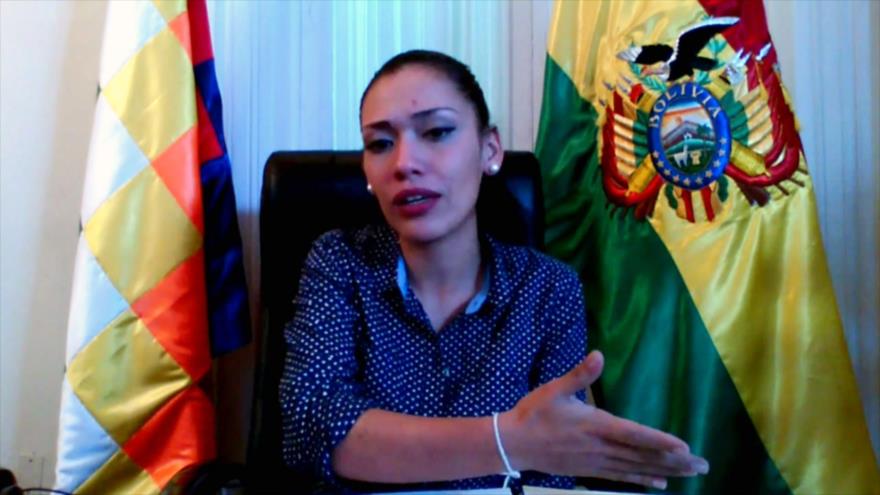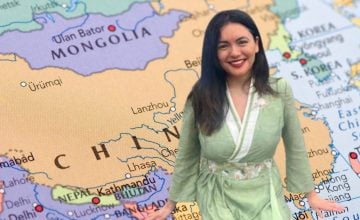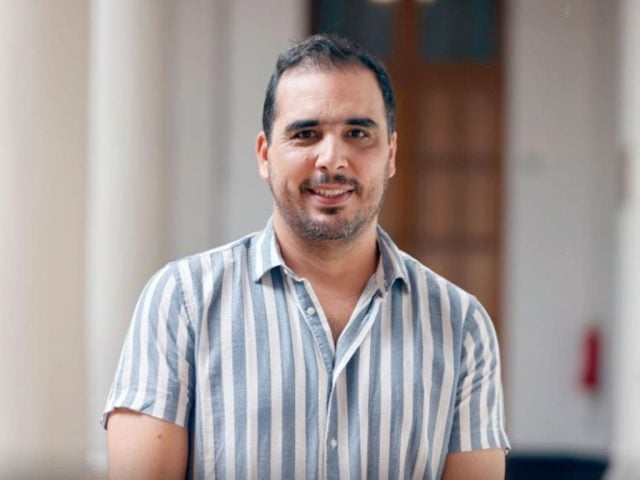Diego Pary is the Bolivian ambassador to the United Nations (UN) and former foreign minister during the government of Evo Morales. He affirmed that the Secretary General of the Organization of American States (OAS), Luis Almagro, on ethical grounds, should resign from his post.
“I believe that beyond the pressure Luis Almagro receives, on ethical grounds, he should resign. He should leave the OAS General Secretariat because not only has he ‘damaged’ (done wrong to) a country, but he has damaged a continent, to all of America», he said in an interview in Voces Sin Fronteras, hosted by Bruno Sommer and Denis Rogatyuk.
By Bruno Sommer and Denis Rogatyuk
I would like us to be able to assess the damage that has been done to Bolivia’s image and its foreign relations with the dictatorial regime of Jeanine Áñez. How would you describe the essence of the foreign policy of Áñez and her Foreign Minister, Karen Longaric?
A single word can summarize what the coup plotters did, the foreign policy promoted by Áñez was simply disastrous. A foreign policy that withdrew Bolivia from multilateral forums, that isolated Bolivia from our neighboring countries, friendly countries.
And I think that this is very regrettable because it has not only isolated Bolivia but what it has done is to isolate the Bolivian people from their relations with the world, from their multilateral dialogue.
Before becoming foreign minister in the government of Evo Morales, you had the role of representing your country before the OAS and – as we know – this organization has played a key role in the 2019 coup d’état. Currently, there is an effort to pressure Luis Almagro to resign as general secretary. What is your opinion on the future of the OAS?
I believe that international organizations are made by member countries, they should not respond to the interests of officials or those who temporarily direct an international organization. International organizations should basically respond to the interests of the peoples, to the interests of the governments and the member States, and in this context we believe that the role played by Luis Almagro is a very regrettable role, a disastrous role and It has damaged a country, it has destroyed democracy, it has damaged development, it has generated social upheaval in a country like Bolivia, and that is very worrying. I believe that beyond the pressure Luis Almagro receives, on ethical grounds, he should resign. He should leave the OAS General Secretariat because not only has he damaged a country, he has damaged a continent, all of America.
In that sense, Luis Almagro has neither the morals nor the ethics to continue at the head of the Organization of American States.
What are the problems that you consider key on the world stage on which Bolivia can advise, deliver knowledge and campaign with other nations?
Bolivia has brought many issues to the world scenario, it is a country that has strengthened multilateralism. Bolivia fully identifies with multilateralism, and in that sense we are going to bring to the world that experience already developed in Bolivia. I believe that we have made very important advances in relation to social, economic, cultural and environmental rights. In this sense, we have promoted the defense of the rights of Mother Earth, the right to water, the right to basic services, the right to health, education, the rights of indigenous peoples, and in that framework we will continue on that line, we will not change our position.
Bolivia is a progressive country, which defends the rights of the peoples and in this sense we will continue working in the United Nations. We will promote everything that is of benefit to the peoples and that allows our peoples to fully exercise their rights. And in that sense, I think that the multilateral agenda that we are going to promote will be very important.
We are going to prioritize three areas: first, quickly reincorporate Bolivia in the different multilateral organizations, make it a protagonist of international dynamics again, but we are also interested in recovering the good diplomatic relations that Bolivia had with the different countries of the world, Bolivia is a country that is – geographically – in the heart of South America, therefore it has to become an axis of articulation, a space for integration of all South American countries, of all Latin American countries, because Bolivia is an integrationist, internationalist country.
In that sense we are going to promote that we can quickly resume our diplomatic relations with all the countries of the world, but also to promote that Bolivia can quickly be one of the fundamental, proactive, dynamic actors within the international context.
One of the first decisions of the Government of Luis Arce has been to reestablish ties with the Governments of Cuba, Venezuela and Nicaragua and rejoin ALBA. How do you see the development of the relationships with these countries in the coming years and what kind of projects do you think Bolivia will develop?
We have not only re-established relations with these countries, but also with other countries such as Argentina, Mexico, Spain, which is one of the important countries for Bolivia because it is the gateway to Europe. Argentina is one of our neighboring countries where we have the largest number of Bolivians living abroad and Mexico is one of the potentially important countries for Bolivian products and in that sense, we are interested in interacting with all the countries of the world.
In the last decade we have managed to move towards Russia, Turkey, China, India…these emerging countries, which are countries that are important in the international dynamics. They have an international presence and we, as Bolivia, are interested in having a permanent dialogue with all of them, but we are also interested in strengthening foreign trade with these countries, which are a very important market.
We are interested in Bolivia’s diplomatic relations with all the countries of the world, but under conditions of equality, respect for sovereignty and the principle of non-intervention in internal affairs.
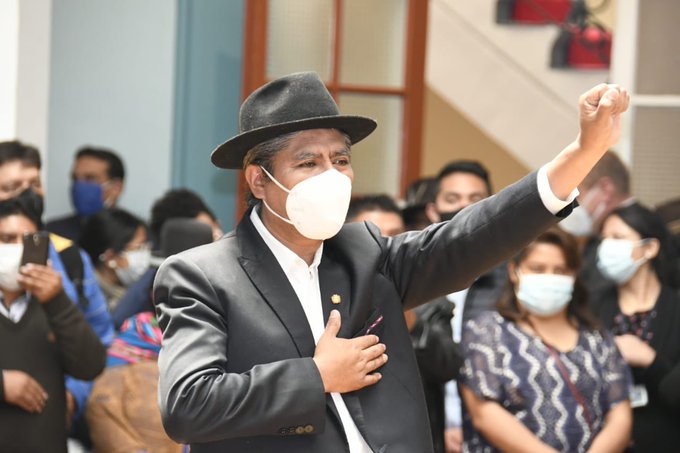
We want to dialogue, we want to work, to build a fruitful relationship with the different countries, but always under the principle of respect for our sovereignty and the principle of non-intervention in the internal affairs of the States.
Evo Morales has spoken of the need to rebuild Unasur and it is something that the president of Argentina, Alberto Fernández, has also said. In your opinion, how are we going to advance in the reconstruction of this very important institution for Latin America and what will be the key objectives of this Unasur 2.0?
CELAC and Unasur are not only organizations that are in force but they are organizations that are a priority for South America, for Latin America. First, Unasur is the space, it is the ‘house’ that integrates all South Americans. Unasur has allowed us to face different difficult moments that our South America has had and within that framework, I believe that it is important to reconstitute, strengthen and project it as a regional organization.
Unasur is not only a construction of the Governments, but it is also a construction of the peoples and in this framework we have to – in the shortest possible time – put Unasur into operation but on the basis of the issues that unite us. There may be different political visions, perspectives in different spheres, but I believe that our governments have to clearly identify those points that unite us, those issues that are common to our countries, that are important to our peoples, and on the basis of these points, re-promote this international organization, that is so important that it can contribute to democracy, development, commercial strengthening. Unasur can contribute to the dialogues between different political actors in our South American region.
But also CELAC – which is the antidote to what the OAS is – is a construction of the peoples. CELAC was born from the initiative of social and popular movements on the continent, and in this framework, governments have to assume that today It is not possible to do diplomacy only from the governments but we have to move towards the diplomacy of the peoples, where social actors and movements also participate in the political debates, not only in their countries but also at the level of international organizations. I believe that CELAC is a great opportunity to integrate, to unite, and to strengthen the Latin American and Caribbean countries and I believe that our Governments should work in this line to recover and project CELAC in the coming months, in the coming years.
How do you see the future development of the relationship with the sister nation of Argentina?
DP: With Argentina we have a ‘brotherhood’, a diplomatic relationship built many years ago. We are very grateful for everything that Argentina has done during the last year, President Fernández has been practically one of the presidents who has led the entire recovery of democracy in Bolivia, and I think it is very important to recognize that contribution, because president Fernández practically put all his confidence on a democratic Bolivia, which respects the sovereign decision of its people, and in that framework we want to thank him and we want to work closely with Argentina.
Argentina is an important country in our South America, in our Latin America, and I think it is also one of the neighboring countries that has an important economic role for Bolivia. A large part of Bolivian gas is exported to Argentina, a large part of the economy that moves between Argentina and Bolivia is part of what is the Gross Domestic Product of the country. The largest number of Bolivians abroad are settled -precisely – in Argentina, and I think that all these issues lead us to think that the union and joint work with Argentina has to be one of our priorities and we will work with that objective in mind.
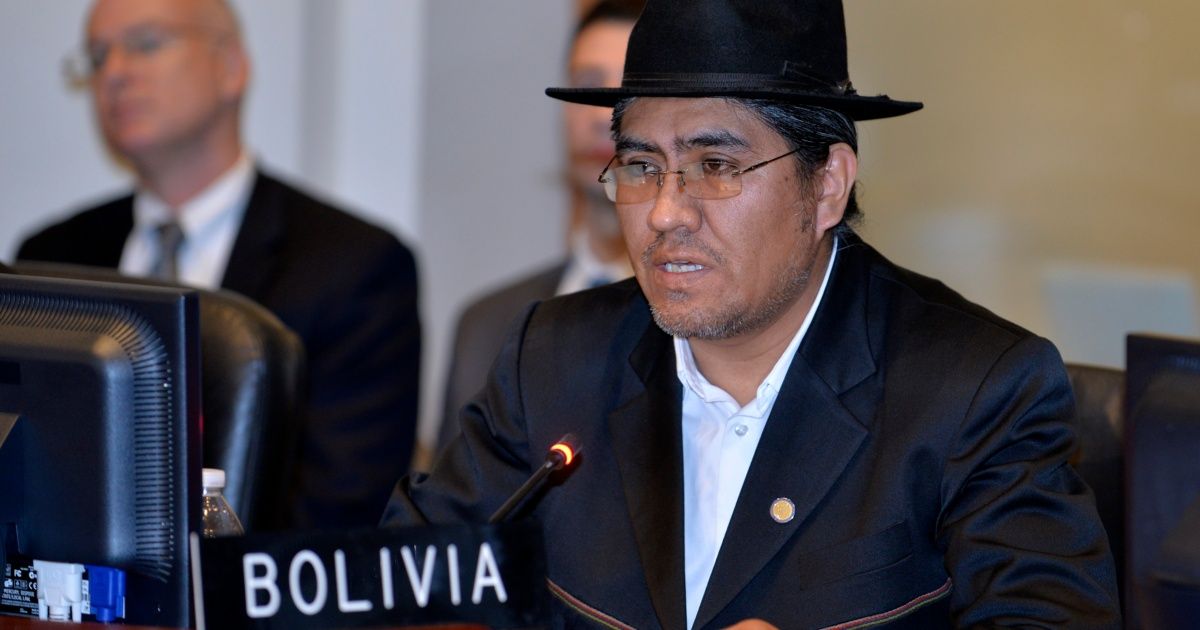
Argentina is also an important actor in regional integration, in Mercosur now that it assumes the presidency it will lead the activities to be developed as a bloc in the next six months and I think it is a good time to recover and project Mercosur, since in recent months it has been diminished by political confrontations, by the different political views that have existed within the bloc.
It is time to retake the agenda, to project it and – for example – retake some negotiations that have been advanced between the European Community bloc with the Mercosur bloc so as to advance on trade issues and I think this is the best time to be able to resume this agenda.
Do you have faith that it will be possible to settle the issue of the right of access to the sea for Bolivia, build a new relationship with Chile from the constitutional process that is going to take place?
First, the right of access to the sea is a right that the peoples have, that our humanity has, and within that framework we have to work with Chile. I believe that the different governments have had different positions, but also I believe that it is time to be able to sit down, look for a solution that is consensual, a solution that is beneficial for both Chile and Bolivia. If the maritime issue is resolved, I believe that there are many issues that are going to flow quickly.
Unnecessarily, two sister countries that we are destined to live, side by side, throughout history, throughout our existence, are confronted by an issue that could easily be solved on the basis of dialogue.
I believe that we can resume this agenda as soon as possible, it will depend a lot on the political will of the Chilean Government, and also the Constituent Assembly, it may be a propitious moment for Chile to analyze and give some general guidelines for the resolution of this historical problem. As long as the maritime issue of Bolivia is not resolved, the sovereign right that Bolivia has to access the Pacific, I believe that the continent will continue to have a pending wound and it will continue to be a pending issue to be resolved.
How do you see the possibility of resuming the 13-point agenda with Chile in the short term? I understand that this regressed the moment the issue was brought to an International Tribunal, but I see that this is a matter of the peoples and, secondly, it is a bilateral issue.
Bolivia has always been willing to immediately resume – on the moment and as long as Chile decides – the dialogue to be able to talk and find a way out on this issue, but I think we need the political will of both countries to find a solution.
The same conclusions, the same resolutions of the lawsuit that was presented before the International Court of Justice in The Hague, establishes very precisely that both countries have common interests and should sit down to dialogue to seek a solution to the maritime issue, I think that the result obtained by the Court of The Hague is a very good beginning and allows both countries to find creative solutions that can be of benefit to both countries, both peoples. There is a brotherhood between our two peoples, the sea is so great, it is an immensity that nature has offered us and I believe that sharing it does not harm anyone, it does not take anything away from anyone. We can share that important and great natural resource that nature gave us.
In this sense, it only takes a little political will and finding creative solutions to be able to make a solution to this historical issue that will heal a wound from many years ago.
I would like to ask you about the future development of the relationship with Russia and China and if there are any specific projects that Bolivia can develop with these two countries.
Undoubtedly there are many projects, not only with Russia and China, Turkey is one of the developing countries that has had significant growth, also India – without a doubt – has great progress, it has the second largest world population in its country , and I believe we have to work with all these countries.
First with Russia we have several cooperation projects, mainly in the area of education and health. We are also working on the productive issue. We have several projects with China, mainly on the issue of electrification and roads. With Turkey we have advanced trade agreements, with China we also have trade agreements. I think there is a very wide spectrum that is open to continue working and advancing and we have to do it, as It corresponds in diplomacy, in international relations.
We have to define a work agenda between both countries and in this way, not only can we benefit as a country from the advances they have, we also have important advances – for example – in terms of forestry development, education with interculturality, in everything that involves the recovery of the knowledge of indigenous peoples, which we can also share with these countries as a positive experience and thus complement each other in order to improve the situation of our citizens, so they have better living conditions. We can build a good life for our peoples, a dignified life for each of the inhabitants of these countries.
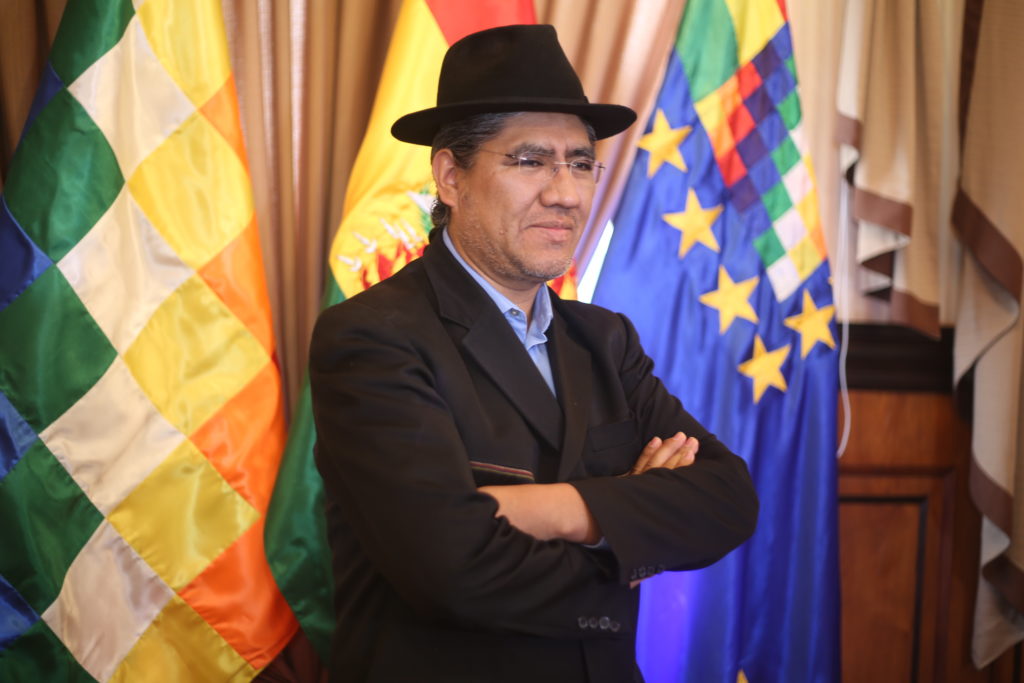
In that sense, we want to work with all the countries of the world, not only with the ones I have mentioned, but with all those who truly want to have a dynamic, proactive relationship with Bolivia and thus, be able to promote our development and growth.
One of the issues that was spoiled by the Áñez dictatorship was the advancement of the relationship – also due to US interests on a strategic resource of Bolivia which is lithium – with a German company to work in this area. Will those relationships be resumed in the short term?
First, it is clear that part of the interests of the coup is sustained by the natural resources that Bolivia has, and at this moment lithium is one of the most precious natural resources in the world. Everyone knows that the batteries of the Cell phones, computers and other devices are made precisely with lithium, and in addition, many ‘officials’ have come out, including from the United States, owners of multimillion dollar companies, who have come out to say that they obviously contributed to the Bolivian coup.
I believe that it is clear that lithium is one of the most important resources at this time and in that context Bolivia is interested in being able to take advantage of this natural resource to strengthen its development, its economic growth, and in that sense we will work with the different countries and companies that are interested.
And without a doubt, Germany is one of the countries that has advanced technology in the field of electric vehicles, in the manufacture of other electronic devices that work with lithium batteries, and therefore we are interested in being able to work with them and I know that the president has instructed a team that can immediately advance and work on it, because we need this natural resource to be of benefit to the development of our peoples, to help economic development, economic growth of the Department of Potosí, precisely where this resource is and the Southwest region of Potosino where we have the Salar de Uyuni which is the largest lithium reserve in the world.
What is your impression of the new administration in the White House? Is there any possibility to improve the relationship between Bolivia and the United States?
The relations of the American people with the Bolivian people are relations of respect, of complementarity, which practically allow us to unite between peoples. We have profound differences with the governments of the United States because the governments have always had an interventionist foreign policy, of subjugation to the peoples of Latin America and the Caribbean, and in that sense we have rejected this type of diplomatic relationship.
If the United States decides to adopt a policy of mutual respect, of non-intervention in the internal affairs of the countries, we obviously will also have the necessary openness to be able to work and coordinate with them. We are interested in interacting with all the peoples of the world, without any limitation, without blockades because of ideological positions, what we want is to identify issues of common interest, the priorities of our countries and on the basis of this, work together.
We are interested in respecting the sovereignty and independence enjoyed by each of the countries of the world and if the country that wants to interact with us has the same principles, then we share the same principles and we will have a relationship that is fruitful and it may be of benefit to our peoples.
